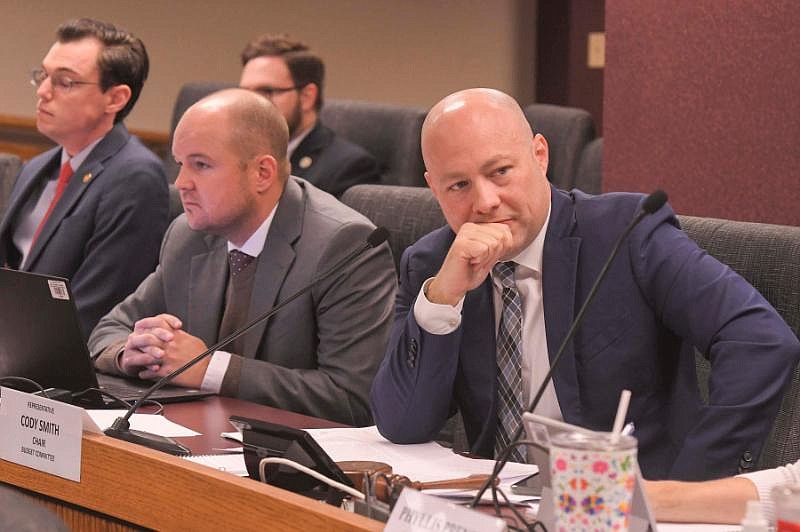The Missouri House on Thursday abandoned its attempt to cut corporate income taxes after Gov. Mike Parson signaled his opposition to the move.
Instead, House Republican leaders put a Senate-passed tax cut plan up for a vote, but not before one Democrat called "shenanigans" because the move blocked plans to offer amendments.
By a 98-32 vote, the House sent the bill to Parson, who praised it as "real relief to taxpaying Missourians."
Parson also issued a modified special session call to align the agenda with the bill as it passed.
Passage of the tax bill means lawmakers have accomplished one of the two tasks Parson put on their agenda. The Senate next week will take up a House-passed bill providing tax credits and other incentives for economic projects in rural areas.
"We called this special session to pass and extend critical support to our agriculture industry and reduce Missourians' income tax burden, and that's exactly what we are accomplishing," Parson said in a prepared statement.
When Parson called for the special session in August, he asked lawmakers to cut the top income tax rate to 4.8 percent from the current 5.3 percent.
The bill heading to his desk cuts the top rate to 4.95 percent immediately and would, if revenue growth meets targets, lower the rate to 4.5 percent in four additional steps.
The new special session call indicates the bill would, when fully implemented, reduce general revenue by $764 million a year. The general revenue fund had $12.9 billion in revenue in the fiscal year that ended June 30. The year ended with a surplus of almost $5 billion.
As debate opened Thursday, Democrats had prepared several amendments. They wanted to give a tax credit to teachers, property tax relief to senior citizens and make a tax credit for lower-income families refundable, meaning they would get a check if the credit exceeded their tax liability.
But when Republicans withdrew the version of the bill that the House Budget Committee changed to include a corporate tax cut from consideration, those amendments became moot. Democrats accused Republicans of blocking proposals to help working families because they did not want to be forced to vote against them.
Though they opposed the corporate tax cut, Democrats complained that withdrawing the bill meant other provisions, including one to eliminate part of the sales tax on tampons and other hygiene products, also died.
"It gets frustrating sometimes when you feel like you are actually delivering results back home, not just to my district but to so many other districts across the state, and then you kind of see the shenanigans of what happened, of just wiping everything clean," said state Rep. Rasheen Aldridge, D-St. Louis.
The tax cut will take effect sometime in early 2023. The exact date is unknown because new laws take effect 90 days after a session ends and the House defeated a provision that would have made it effective on Parson's signature.
Debate on the House floor centered on whether the bill will provide enough relief to Missourians dealing with inflation and higher property tax bills. The sponsor, House Budget Chairman Cody Smith, said the bill will help.
"This is for the folks who are paying the bills," Smith said.
Lower taxes will help everyone, he added.
"The people who are advocating for this bill understand that low taxation leads to economic prosperity," Smith said.
But Democrats, and at least one Republican, said the bill isn't targeted at the people hit hardest by rising costs.
State Rep. Peter Merideth, D-St. Louis, said the bill will make it harder for the state to pay for schools, provide state worker pay raises or find people to work in state prisons and mental health hospitals.
"This is the definition of irresponsible," Merideth said.
In testimony to the House Budget Committee, Jeremy LaFaver of the Missouri Budget Project estimated the lowest 20 percent of income earners will save about $3 a year and the top 1 percent, with incomes averaging $1.5 million, will save more than $15,000 a year.
Republican Rep. Bill Kidd of Buckner asked his colleagues to provide relief to poor Missourians and senior citizens in the 2023 legislative session.
"Please do something that will impact real people," Kidd said, adding "If you are in the $100,00 to $200,000 range, you are going to like this tax cut. But if you are a poor person or a person on a fixed income, this doesn't do it."
In a statement issued after the House vote, Sen. Lincoln Hough, R-Springfield, said he was pleased the House passed the bill he sponsored in the Senate without making any changes.
"In addition to immediately easing the burden of near-record inflation and providing the largest income tax cut in state history, this legislation establishes a fiscally-responsible blueprint that will continue to provide tax relief to hardworking Missourians for years to come," Hough said.
The Missouri Independent, www.missouriindependent.com, is a nonprofit, nonpartisan news organization covering state government and its impact on Missourians.

